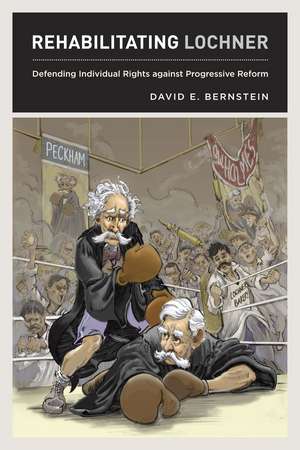Rehabilitating Lochner: Defending Individual Rights against Progressive Reform
Autor David E. Bernsteinen Limba Engleză Hardback – 19 mai 2011
Tracing the influence of this decision through subsequent battles over segregation laws, sex discrimination, civil liberties, and more, Rehabilitating Lochner argues not only that the court acted reasonably in Lochner, but that Lochner and like-minded cases have been widely misunderstood and unfairly maligned ever since.
Preț: 472.66 lei
Preț vechi: 613.84 lei
-23% Nou
Puncte Express: 709
Preț estimativ în valută:
90.46€ • 93.44$ • 75.28£
90.46€ • 93.44$ • 75.28£
Carte tipărită la comandă
Livrare economică 25 martie-08 aprilie
Preluare comenzi: 021 569.72.76
Specificații
ISBN-13: 9780226043531
ISBN-10: 0226043533
Pagini: 208
Dimensiuni: 152 x 229 x 18 mm
Greutate: 0.43 kg
Editura: University of Chicago Press
Colecția University of Chicago Press
ISBN-10: 0226043533
Pagini: 208
Dimensiuni: 152 x 229 x 18 mm
Greutate: 0.43 kg
Editura: University of Chicago Press
Colecția University of Chicago Press
Notă biografică
David E. Bernstein is Foundation Professor at the George Mason University School of Law and the author of several books, including, most recently, You Can’t Say That! The Growing Threat to Civil Liberties from Antidiscrimination Laws.
Cuprins
Acknowledgments
Introduction
Introduction
1. The Rise of Liberty of Contract
2. The Lochner Case
3. Progressive Sociological Jurisprudence
4. Sex Discrimination and Liberty of Contract
5. Liberty of Contract and Segregation Laws
6. The Decline of Liberty of Contract, and the Rise of “Civil Liberties”
7. Lochner in Modern Times
2. The Lochner Case
3. Progressive Sociological Jurisprudence
4. Sex Discrimination and Liberty of Contract
5. Liberty of Contract and Segregation Laws
6. The Decline of Liberty of Contract, and the Rise of “Civil Liberties”
7. Lochner in Modern Times
Conclusion
Notes
Index
Recenzii
"Intellectual history in its highest form. . . . Bernstein has done nothing less than explode the myth of Lochner, a decision that any pro-liberty student of American constitutional law should embrace. This is a book that will transform the way constitutional law is understood for years to come."
"As every law student know, Lochner was a case in which a court packed with business sympathizers stuck it to the little guy in a shameless display of judicial activism. But, like a surprisingly large number of things everyone knows, this conventional wisdom is almost entirely wrong, and David E. Bernstein's new book, Rehabilitating Lochner, makes clear just how wrong it is—and how and why the Lochner narrative became established in the legal academy. . . . The false narrative of Lochner has controlled the past for decades but Bernstein's clear and incisive work may wrest that control away and move us back to the truth."—Glenn Reynolds, Commentary
“An exhilarating book full of interesting new perspectives. Rehabilitating Lochner will change the way people think about the transition from the late nineteenth century to the modern New Deal and Civil Rights regime. It does what good revisionist history should do: see what is familiar in new ways.”—Jack M. Balkin, Yale Law School
“David E. Bernstein attempts the grand task of 'correcting decades of erroneous accounts' and succeeds with aplomb and notable timeliness. The story of how Joseph Lochner fought legislators and unions to bake his goods in freedom goes especially well with tea.”
“David Bernstein drives home powerfully and convincingly the fact that the supporters of Lochner were the biggest proponents of protecting the personal rights of African Americans, Roman Catholics, and other minorities. Rehabilitating Lochner will have a profound impact on constitutional law scholarship.”
“A terrific work of historical revisionism, Rehabilitating Lochner brings out some attractive resonances in libertarian themes associated with the widely disparaged constitutional jurisprudence of the period from 1905 to 1937, and some discordant undertones to the Progressive themes sounded during that period. It should induce some changes in the way many students and scholars read the cases from that period.”—Mark Tushnet, Harvard Law School
"Rehabilitating Lochner is about a US Supreme Court decision that generations of lawyers and law students have been taught to scorn as the imposition of obsolete economic dogma disguised as constitutional principle. Comes now David E. Bernstein to set the record straight. . . . Not all will find unchallengeable every point the author makes. Yet all will broaden their understanding of our national charter and what the Supreme Court has done with it over the past century or so."—Walther Barthold, New York Law Journal
“David E. Bernstein takes issue with conventional wisdom and argues that if one understands the larger context and broader stream of historical development, Lochner was a ‘good law’ at the time and, despite the fact that it was overruled, its core principles remain good constitutional law today. This is a delightful and informative book that deserves a broad audience.”
"Rehabilitating Lochner does what it sets out to do very well, placing Lochner in its historical context, telling us where it came from, what it actually did, who attacked it, and what those people believed. . . . I highly recommend it to anyone interested in the topic."—Independent Review
"A sharp and iconoclastic work of scholarship, one that challenges the deepest beliefs of those who defend almost omnipotent government."—Carolina Journal
"In this thought-provoking volume, David E. Bernstein attempts to “rehabilitate” the Lochner decision and place it in its proper historical context. . . .The book is a valuable corrective. . . . Bernstein approaches the material with a fresh perspective and a cogent analysis that questions both the received wisdom about Lochner and the categories that legal scholars have established to create distance between that era and our own, between judicial defense of civil rights and the judicial defense of economic liberties.”
“This well-written book is destined to be influential and controversial. . . . It is concise, lively, and one of the best examples of libertarian thinking about the Supreme Court’s role in limiting economic regulation.”
